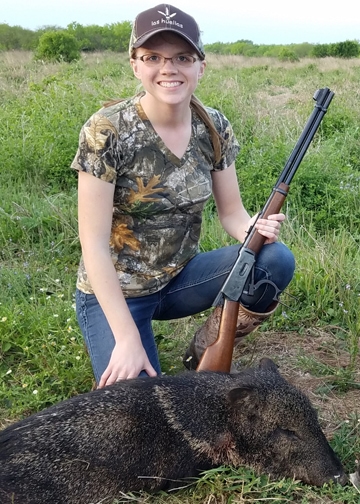
Lisa Zoromski
Texas A & M University - Kingsville
M.S. student, Range and Wildlife Management, Caesar Kleberg Wildlife Research Institute
Social behavior and movement ecology of nilgai antelope
I grew up in Appleton, Wisconsin, and wanted to pursue a career in wildlife research at an early age. I earned my Bachelor’s degree in Wildlife Ecology at the University of Wisconsin – Stevens Point. Soon after graduation, I saw an announcement for a nilgai antelope master’s project, that was perfect for my interests. I was fortunate to be accepted into the program, and headed off to Kingsville, Texas. My interests are in improving efficiency of wildlife management, reducing human-wildlife conflicts, and wildlife disease. Nilgai are an exotic species that were introduced to Texas around the 1920’s-40’s, and quickly expanded throughout much of South Texas and Northern Mexico. Research is lacking on nilgai ecology. Nilgai present an important management challenge due to their potential role in the transmission of cattle fever ticks. Cattle fever ticks are a serious economic threat to the U.S. cattle industry, with the ability to transfer bovine babesiosis (“Cattle Fever”). Nilgai are not typically attracted to bait or lures, making administering a tick treatment for nilgai challenging. To implement an efficient CFT eradication measure on nilgai, further information on nilgai movement and behavior ecology is needed. Nilgai latrines (or dung piles) and fence crossings are fixed areas that nilgai repeatedly re-visit. My goal is to investigate nilgai behavior and movements at latrine sites and fence crossings, to assess the potential to use these sites for delivery of tick treatments to nilgai.
UPDATE
I am thankful to be a recipient for the 2019-2020 Dan L. Duncan scholarship. I am honored to have the Houston Safari Club Foundation support my education and research at Texas A&M University – Kingsville. I recently graduated with my master’s degree studying “Social behavior and movement ecology of nilgai antelope.”
As I was wrapping up my thesis, I was busy presenting results for various organizations and events. I was able to travel to Reno, NV last fall for an oral and poster presentation at the Annual Wildlife Society Conference. While that was a great experience in itself, I was grateful to also advise one of my undergraduate technicians with presenting a poster based off of the nilgai research. Her poster received attention from The Wildlife Society’s news editor for advertisement on their website.
Last fall, I was surprised to be selected for a program to have a Congressman visit and learn about my research through the American Institute of Biological Sciences. I was able to have the Congressman and staff visit my study site to see my research in action. I had an interest in wildlife policy, and this was a great experience to advocate for federal investments in biological sciences. It led to a newsletter article about the visit, and then other organizations in Texas contacted me to learn more. I believe the most important aspect of research is how you are able to present your findings and influence others. I am currently writing publications on my findings to share with the scientific community and the public.
The Caesar Kleberg Wildlife Research Institute through Texas A&M University – Kingsville provided me with incredible opportunities to gain experience in both wildlife techniques and leadership skills. Since I grew up in Wisconsin, moving to Texas was a different culture and environment for me. The skills I gained working with private landowners and organizations in Texas helped me acquire my current position.
I currently work as a Wildlife Technician for USDA in Ohio, where I communicate with the public daily to reduce human-wildlife conflicts. Undoubtfully, the Houston Safari Club Foundation has positively impacted my graduate experience. I am extremely appreciative of the Houston Safari Club Foundation for supporting my education and passion for wildlife.

